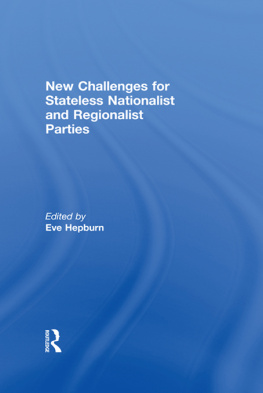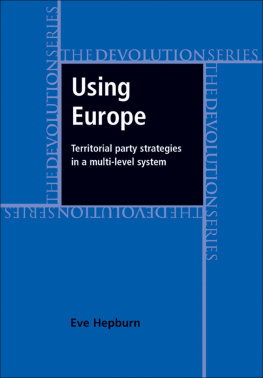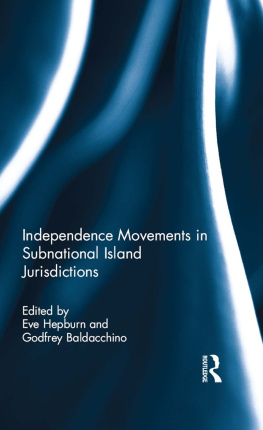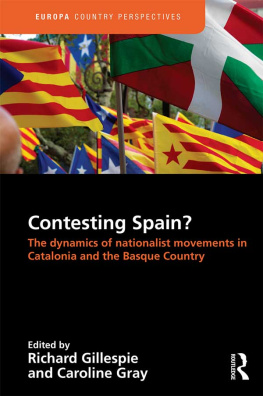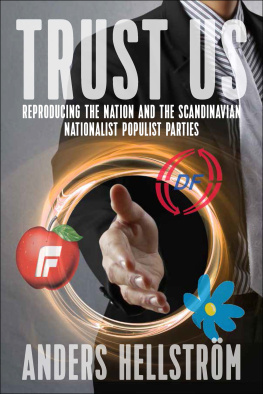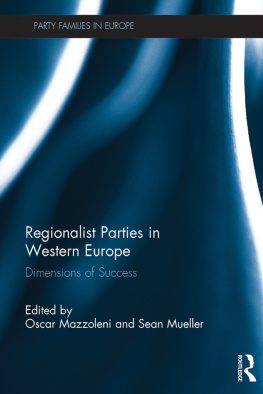New Challenges for Stateless Nationalist and Regionalist Parties
Throughout Europe, stateless nationalist and regionalist parties have moved from being niche actors in party systems to mainstream political players. No longer the outsider in party politics, these parties have successfully entered government at the regional and state levels and many have been responsible for pushing the agenda for radical constitutional change in the United Kingdom, Spain, Italy, Belgium, Germany and France.
However, the transformation of these parties from peripheral movements to established parties of government does not come without its problems. Whilst these parties were once able to focus on the single issue of self-determination, they have been forced to change their strategies, alter their behaviour and compromise on their principles in order to succeed in an era of electoral volatility, partisan dealignment and multi-level governance.
This book explores how stateless nationalist and regionalist parties across Western Europe have responded to the twin challenges of multi-level politics (i.e. operating
at the regional, state and European levels), and a multi-dimensional policy space, whereby they must articulate policy proposals alongside their territorial demands. Written by leading experts in the field, this is a cutting-edge collection of theoretical, analytical and empirical work on the challenges currently facing nationalist and regionalist parties in Europe.
This book was previously published as a special issue of Regional and Federal Studies.
Eve Hepburn is Senior Research Fellow in Politics at the University of Edinburgh. Her research explores party responses to multi-level governance, dynamics of regional party systems, and decentralisation in the UK, Italy, Germany, Spain and Canada. She has published widely in the field, and is the author of Using Europe: territorial party strategies in a multi-level system (Manchester University Press, 2010).
First published 2011
by Routledge
2 Park Square, Milton Park, Abingdon, Oxon, OX14 4RN
Simultaneously published in the USA and Canada
by Routledge
270 Madison Avenue, New York, NY 10016
Routledge is an imprint of the Taylor & Francis Group, an informa business
2011 Taylor & Francis
This book is a reproduction of Regional and Federal Studies, vol. 19, issue 4-5. The Publisher requests to those authors who may be citing this book to state, also, the bibliographical details of the special issue on which the book was based
Typeset in Times by Value Chain, India
Printed and bound in Great Britain by MPG Books Group, UK
All rights reserved. No part of this book may be reprinted or reproduced or utilised in any form or by any electronic, mechanical, or other means, now known or hereafter invented, including photocopying and recording, or in any information storage or retrieval system, without permission in writing from the publishers.
British Library Cataloguing in Publication Data
A catalogue record for this book is available from the British Library
ISBN13: 978-0-415-57181-4
Introduction: Re-conceptualizing Sub-state Mobilization
EVE HEPBURN
Throughout Europe, stateless nationalist and regionalist parties (SNRPs) have moved from niche actors in party systems to mainstream political players. No longer the outsider in party politics, these parties have successfully entered government at the regional and state levels and many have been responsible for pushing the agenda for radical constitutional change. Yet the success of SNRPs in moving from protest to power is not without its challenges. This contribution explores the importance of nationalist and regionalist party adaptation to the twin challenges of multi-level politics (i.e. operating at the regional, state and European levels) and a multi-dimensional policy space, whereby they must articulate policy proposals alongside their territorial demands. As a result of these challenges, there is a need to re-conceptualize what SNRPs are fighting for, and the compromises they are willing to accept to achieve success.
Explaining Regionalist Party Positioning in a Multi-dimensional Ideological Space: A Framework for Analysis
EMANUELE MASSETTI
This contribution proposes an analytical framework for explaining regionalist parties ideological positioning in the multi-dimensional political space. It focuses on three ideological dimensions: centreperiphery, leftright and European integration. Positioning along the first two dimensions is explained in terms of socio-structural characteristics of the regions and the incentives posed by institutional/political environments. Then mutual influences between positioning on the three different ideological dimensions are discussed. The structural characteristics of the regions are particularly useful in locating the main regionalist party in each region to the left or right of centre and, to some extent, in explaining centreperiphery radicalism. Voting systems and the dynamics of (multi-level) party systems help us to explain political fragmentation of the regionalist movement, changes of positions through time and the adoption of moderate or radical positions in both centreperiphery and leftright dimensions. Finally, the analysis of cross-dimension positioning suggests that moderate centreperiphery stances (i.e. non-secessionist) tend to match with liberal or (especially Christian-democratic) moderate and conservative positions. It also suggests that anti-European integration positions match with leftright radicalism and, increasingly so, with centreperiphery radicalism.
From Protest to Power: Mapping the Ideological Evolution of Plaid Cymru and the Bloque Nacionalista Galego
ANWEN ELIAS
Whilst some authors have classified nationalist and regionalist parties as niche parties, this contribution argues that such a categorization is of limited usefulness for understanding the ideological nature of this party family. The ideological evolution of two partiesPlaid Cymru in Wales and the Galician Bloque Nacionalista Galego (BNG)is mapped in order to demonstrate how their core ideology (the territorial re-configuration of political authority) has been moderated and added to over time. As a result of this ideological adaptation, it is argued that these parties can no longer be described accurately as niche parties. Ideological adaptation is attributed to the pressures associated with the pursuit of vote-seeking, policy-seeking and office-seeking goals. Such pressures come to bear on any political party that seeks to evolve from being a party of protest to being a party in power, and nationalist and regionalist parties are not immune to the dilemmas and risks associated with a change in the status of a political party (for example, as a result of passing the thresholds of representation and/or government). However, it is also necessary to give due consideration to the multi-level political context which is intrinsic to the political and electoral strategies of regionalist and nationalist parties, if the causes and implications of these actors ideological evolution are to be fully understood.
The Rise and Fall of the Belgian Regionalist Parties
KRIS DESCHOUWER
Regionalist parties were very successful in Belgium in the 1960s and 1970s. Their impact on the political system was important, since their regionalist agenda has led to a thorough reform of the state towards a federal logic and to a full split of the party system. Yet, today, the regionalist parties are either gone or struggling for survival and for a significant place in the political debate. In this article we describe the spectacular electoral rise of the regionalist parties and the subsequent search for an electoral niche in a party system where all parties are limiting their electoral presence to their own language group and have therefore all become, to a certain, extent regionalist parties.

